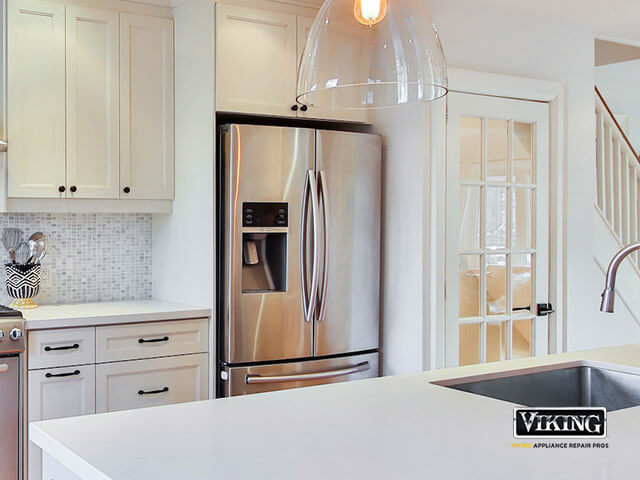
Maintain Kitchen Appliances: DIY Care Essentials
Keeping your kitchen appliances in top-notch condition not only extends their lifespan but also ensures optimal performance. Explore essential do-it-yourself (DIY) maintenance tips to keep your kitchen running smoothly and efficiently.
Understanding the Importance of Regular Maintenance: Prolonging Appliance Life
Regular maintenance is the key to prolonging the life of your kitchen appliances. Just as a car requires periodic tune-ups, your appliances benefit from routine care. Regular maintenance helps prevent breakdowns, reduces the need for repairs, and ultimately saves you money in the long run by avoiding costly replacements.
Cleaning Refrigerator Coils: Enhancing Efficiency
Refrigerator coils play a crucial role in heat exchange, and when they’re covered in dust and debris, efficiency is compromised. To maintain optimal performance, unplug the refrigerator and clean the coils using a vacuum or a coil brush. This simple task enhances energy efficiency and helps your refrigerator cool more effectively.
Checking and Replacing Refrigerator Seals: Ensuring Airtight Closure
The rubber seals, or gaskets, on your refrigerator and freezer doors are essential for maintaining an airtight seal. Regularly inspect the seals for wear or damage. If you notice any issues, replace the seals promptly to ensure an efficient closure. A tight seal prevents cold air from escaping and keeps your food fresh.
Cleaning the Oven: Removing Grease and Residue
A clean oven not only looks better but also functions more efficiently. Regularly clean the interior of your oven to remove built-up grease and food residue. For a natural cleaning solution, mix baking soda and water to form a paste. Spread it on the interior surfaces, let it sit, and then wipe away the grime. This DIY cleaning method avoids harsh chemicals.
Maintaining Dishwasher Filters: Preventing Clogs
Dishwashers have filters that trap food particles and prevent them from clogging the drainage system. To maintain your dishwasher’s efficiency, clean the filters regularly. Consult your appliance manual for guidance on locating and removing the filters. Rinse them under running water to remove debris, ensuring smooth operation.
Deodorizing the Garbage Disposal: Eliminating Odors
Over time, your garbage disposal can develop unpleasant odors. Refresh it by grinding ice cubes and citrus peels to eliminate odors and clean the blades. Follow up with a mixture of baking soda and vinegar to sanitize the disposal. Regular deodorizing keeps your kitchen smelling fresh and prevents the buildup of bacteria.
Cleaning Range Hood Filters: Improving Air Quality
Range hood filters trap grease and impurities, preventing them from circulating in your kitchen. To maintain good air quality, clean or replace the filters regularly. Most filters are dishwasher-safe, but check your appliance manual for specific instructions. Clean filters ensure that your range hood effectively removes cooking odors and airborne particles.
Testing and Calibrating Oven Temperature: Ensuring Accuracy
If your oven temperature is not accurate, it can affect the outcome of your culinary creations. Use an oven thermometer to test the temperature accuracy. If adjustments are needed, consult your oven manual for calibration instructions. A well-calibrated oven ensures that your dishes bake and roast as intended.
Descaling the Coffee Maker: Improving Coffee Flavor
Over time, mineral deposits can accumulate in your coffee maker, affecting the taste of your coffee. Descaling removes these deposits and improves the flavor of your brew. Use a mixture of equal parts water and white vinegar to run a descaling cycle. Follow up with a few cycles of plain water to remove any vinegar residue.
Cleaning and Lubricating Garbage Disposal Blades: Maintaining Smooth Operation
Garbage disposals can benefit from occasional cleaning and lubrication to ensure smooth operation. Turn off the disposal, disconnect the power, and use a long-handled brush to clean the blades and surrounding areas. After cleaning, lubricate the disposal by running a few ice cubes through it. This DIY maintenance step helps prevent jams and keeps the disposal functioning efficiently.
Conclusion: A Well-Maintained Kitchen
Regular DIY maintenance of your kitchen appliances is an investment in their longevity and performance. By incorporating these essential care tips into your routine, you ensure that your appliances operate efficiently, saving you time and money in the long term. For additional insights and smart home solutions, visit DIY Kitchen Appliance Maintenance.
